Grill of My Dreams
My suburban life is complete, plus very long thoughts on urbanism and culture war
Five years of waiting are over:
My dad helped assemble our new grill while my parents visited us for Easter. We christened it with some fancy steaks, which were delicious, but they didn’t make as nice a photo. That chicken though. Not bad!
I’ve been looking at a version of this grill for years; I think this one is new for 2022, but it’s comparable to a similar model they’ve been selling for awhile. It’s the Weber Genesis E-325s, the cheapest (but still pricey) model in this current lineup. You can pay extra for stainless steel grills and a stainless body; I read that the stainless steel just discolors. The steel shelves on mine, after a couple of days, are streaked from condensation. I need to dig out my bottle of stainless steel cleaner. There’s also a mostly useless and up-charged “smart” model. I say keep it simple.
This is a fantastic, built-like-a-tank grill. My dad has a Weber from the early 2000s. The body is fully intact; the interior parts can be easily replaced, and have been at least once. Weber is a very good company as far as product support and parts availability go.
I kept wondering if I should go the Ikea route here; grab a Dyna-Glo for $200 and just replace it every three or four years when it rusts apart. But I don’t like that philosophically, and it’s also extra work. In the long run it probably doesn’t save money. Now I never have to think about buying a grill again. It was this review that sealed the deal for me. And then there are the reviews of the Dyna-Glo, e.g.:
This grill caught on fire where the propane tank connects and caused a bad fire warranting the fire department. Home Depot was very easy to work with on the return. We chose to purchase the same exact grill hoping it is unlikely this will occur again and there is nothing defective with the product.
My wife bought me a beautiful set of grilling tools back in early 2017, when we were looking for our first place.
I didn’t know grills weren’t allowed on condo balconies, even all-masonry ones, so after a couple of months of expectation I had to put the tools deep in a closet and wait till we had a house or a townhouse.
And now we finally do.
Some time ago I saw someone on Twitter with a meme poking fun at newly minted suburbanites. Something like “Suburban starter pack,” with images of plastic lawn chairs, a lawnmower, a barbecue grill, etc. I guess the idea was to point out how everybody has their little postage-stamp yard with all the same plastic crap from the big-box store. Little islands of tacky opulence.
I think it’s true that suburbia impoverishes the public realm, in the sense that it is, and is intended to be, a private duplication of or replacement of the public realm. But that said, having a barbecue grill isn’t part of that phenomenon any more than having a kitchen is. I don’t live near a park with built-in charcoal grills, anyway. But here’s one about 15 minutes away. Maybe they’ve been fixed since I snapped the photos; we didn’t try another barbecue there.
Chicken and egg, maybe. But I like my grill.
Last year, when we were looking for a house, a colleague mentioned that in Fairfax County a grill could not be legally operated or stored on a deck, and that it was supposed to be kept 15 feet from an exterior structure wall.
These regulations do not apply to detached houses and townhomes. But he didn’t specify that, and somehow I didn’t ask. I even looked up the county’s regulations, and I missed the “exception” language, which I still think is unclear:
Prohibited Operation & Storage. In accordance with Section 308.1.4 of the Fire Prevention Code (as amended by Fairfax County), charcoal burners and other open-flame cooking devices fueled by combustible or flammable gases, liquids, and solids shall not be operated or stored on a balcony or deck of any structure or within 15 feet of combustible construction or residential occupancy. The two exceptions to this prohibition include (a) cooking devices using electricity as a heating source and listed by a recognized testing authority and (b) operation and storage of these devices at detached one- and two-family dwellings and townhouses [my emphasis]. In addition, Section 313.1 of the Fire Prevention Code prohibits the storage, operation, or repair of fueled equipment such as portable cooking equipment within a building.
Saying “grills are prohibited except in townhomes and detached houses” is almost like saying “motor vehicles are prohibited except on official roads.” Of course a prohibition of open flames near buildings where potentially hundreds of people live is a sensible idea, even if the risk is low. Debatable, maybe, but sensible.
But, assuming my liberal county had gone full safetyist against grills, I ended up writing what I thought was a pretty fine article on overbearing regulations, how housing and urbanism get caught up in the culture war, and why some people want to “escape” or “flee” these kinds of rules—and the population densities and political attitudes which seem to engender them.
It is a fine article, I think, except that its central premise was something I had, accidentally, completely made up. Even I—urbanist, communitarian, critic of individualistic consumerism—actually believed one of America’s most famous counties had effectively shadow-banned barbecue grills, and I didn’t like it. I ended up making, through my mistake, the very error I was critiquing in (even more) conservative folks who see urban life as some kind of plot against them.
So in order to share my extended thoughts about all of this, I’m sharing the draft of my (obviously never published) article. Remember, though, that my characterization of the regulations on barbecue grills is not correct.)
Corny or predictable as it might be, one of the things that most excites me about the idea of owning a house one day is being able to have a grill out back. Every house I knew as a kid, including my own, had a grill on the deck or patio, and nothing beat those cozy nights eating burgers or steaks or chicken thighs outside, watching the fireflies and listening to the summer insects.
So recently, I was rather dismayed to learn that in Fairfax County, Virginia, where I currently live, it is illegal to operate—or even to store—a barbecue grill on a wooden deck, even if you own a detached house. It is also illegal—I think, because the county’s webpage on the matter uses the term “against the law” but also a weaker “strongly encouraged”—to operate a grill within 15 feet of the exterior wall of a residential structure.
In other words, every single barbecue grill I have ever seen in Fairfax County, and quite possibly every barbecue grill in Fairfax County, is being stored and operated illegally. Heck, at one open house I even saw a grill connected to a natural gas line coming out of the exterior of the house. (Did that illegal placement stop the listing agent from advertising a gas line ready for your grill? What do you think?)
I expect the county knows this; I assume they don’t care. So what difference does it make? If the county wants to ticket you for revenue purposes, it can do so at will. And if your nosy neighbor—the one with whom you have an ongoing argument over the fence or the tree or running the leaf blower on the weekend—decides to get back at you, he can simply phone the county and alert them to the “fire hazard” in your backyard. Presumably, you could then retaliate by doing the same to him.
Has a barbecue grill—a gas- or charcoal-operated model with open flames—ever caused a deck or house fire? If you were to ask me that, I’d guess: probably not. And I would be wrong: There are, in fact, a non-negligible number of home fires attributed to grills every year. The National Fire Protection Association claims:
In 2014-2018, grills, hibachis or barbecues were involved in an average of 10,600 home fires per year, including an average of 4,900 structure fires and 5,700 outside or unclassified fires. These fires caused annual averages of 10 civilian deaths, 160 reported civilian injuries, and $149 million in direct property damage.
Even if those numbers are somehow inflated, which, to be clear, I have no reason to suspect—they’re still rather higher than you might expect. What accounts for that? How many of these fires occur during normal operation, as opposed to fooling around by the grill, or allowing a grill to deteriorate without doing anything to maintain it? I struggle to visualize how sizzling some hot dogs in a contained steel box ends with burning down the house. Maybe I’m just a good griller.
It turns out that grills are far from the most likely source of residential fires. In that same 2014-2018 period, the NFPA reports that “US fire departments responded to an estimated average of 172,900 home structure fires per year started by cooking activities,” mostly due to home stoves. In a slightly different period, candles caused about two-thirds as many fires as grills, even more indoor fires, and, sadly, a greater loss of life: “From 2015-2019 U.S. fire departments responded to an estimated 7,400 home structure fires that were started by candles per year. These fires caused an annual average of 90 deaths.”
Nobody tells you to drag your indoor six-burner gas range 15 feet from the exterior of your house. Maybe I shouldn’t give the regulators any ideas.
What about the people who make the grills; where do they stand on fire safety? Weber, which sells grills but also no doubt has lawyers, recommends a mere 24 inches of space between the grill and any combustible material. That’s about the distance I’d personally consider safe, knowing very little about fire safety; if anything, I might leave a few feet more.
All of this is a roundabout way of saying that because I am looking forward to owning a grill one day, I take my county’s strict regulations personally. This is not the only minor annoyance (at least for some people) of living in a highly populated, very liberal place like Northern Virginia.
Fairfax County also taxes plastic bags. Virginia requires yearly maintenance inspections and biennial emissions inspections on cars. (Many states do not!) A lot of energy has been spent in recent years renaming all things “Lee” and “Jackson,” which in Virginia is a lot of things. Masking and other COVID precautions lingered a long time here, and restaurants still don’t feel as heavily patronized as they were pre-pandemic. Most of this doesn’t bother me; heck, I wrote a whole article about why I like plastic bag taxes; Lee and Jackson mean nothing to me; I still sometimes put my mask on; and you know what I generally think about cars, even if I’m conflicted about it.
But I grew up in a more sparsely populated and semi-rural part of Central Jersey, where people prized their large lots and the privacy those lots afforded them. My parents came there from crowded, nosy Long Island and never looked back. That spirit has stuck with me to some extent, which helps me understand why the accumulation of these sorts of regulations, rules, and bylaws can eventually start to look like the outworking of some kind of ideology. There are a lot of different ways of expressing this feeling: I’ve heard it described as “safetyism,” overbearing environmentalism, busybody progressivism, and the “nanny state.” I can imagine it being cast as a leftist project of imposing needless rules to deliberately take America down a peg, or gleefully importing European privations in the name of some abstract good. You know how it is—those people want us to “eat bugs” and “live in pods”; of course they want to punish us for using grills, too.
I say all of this because frequently, when I talk about zoning or housing with conservatives, I will hear one of these things mentioned (or something else like it) which has absolutely nothing to do with housing. How do these issues become linked in people’s minds, such that “building more housing” turns into, well, any or all of that other stuff? Why is it that I’m hearing about illegal immigrants or gender ideology within five minutes of talking about a new development proposal?
At first this utterly baffled me. But I’ve begun to understand it. Circling back to grills, it clicked for me when I was reading that county webpage about fire safety. “Get a load of this BS,” I thought. “Maybe we should move out to Winchester or Front Royal where nobody gives a crap about any of this. Now you can’t even have a grill on your own damn deck. What’s this country coming to?”
I could feel the associations forming in my mind. I could see perfectly well that while I was fine with COVID precautions, say, many people viewed them exactly as I viewed my county’s grill regulations. We all draw our lines somewhere. But there’s no question that those cheaper, more remote, less settled parts of the state—or cheaper, more remote, less settled states—do feel freer. You can do more things with your house and your land. You can get away with more things, too, even if there’s technically an ordinance regulating or prohibiting it.
You can look at deep-blue Arlington, Fairfax, and Loudoun, and you can think, “The same people building apartments like crazy and talking about a ‘housing crisis’ want to tell us where we can put our grills and take away our grocery bags because of global warming, and if we don’t stop them they’ll come out here and do the same thing.”
There was a time—before I was an urbanist and a housing advocate, before I appreciated cities and older suburbs for their liveliness and energy—when I basically would have felt this way. I would have just sort of assumed, as so many comfortably housed suburbanites and rural Americans do, that building new housing was one little piece of a much larger, vaguely nefarious leftist agenda.
What becoming an urbanist did for me was help me to unbundle these things, to see that liberal or progressive “ownership” of urban and housing issues is not an inevitability but an accident. Folding housing—one of the most basic human needs and most important industries alike—into America’s culture war does nothing but sow confusion and hurt the most vulnerable.
Furthermore, if you go looking, you can see that housing and land use transcend partisan politics quite a bit. For example, my hometown’s very liberal mayor nixed the town’s old off-street parking requirement on Main Street. See, the left hates cars. But not so fast: there was basically nowhere to put off-street parking, and so meeting that requirement was prohibitively expensive. The beneficiary of the rule change is current and potential small business owners on Main Street.
Municipalities all across the country are looking at zoning reform, some of them very liberal (Portland, Minneapolis) and some less so (Gainesville, Florida). Virginia Governor Glenn Youngkin, a culture warrior par excellence, even recently took a swipe at “restrictive zoning policies” driving up home prices in the state. A housing group to which I belong is led by a Catholic libertarian. At the local level, the coalitions that rally around these reforms are frequently quite politically and ideologically diverse.
None of this is very obvious. It doesn’t feel obvious, especially if you consume right-wing media where the headlines read “Democrat war on cars” or “The Left’s war on suburbs.” I almost felt that seething about those barbecue regulations. It takes a certain discipline not to give into such satisfying but simplistic narratives. I try.
But I still want my grill on my deck.
I still do, and, happily, I’m allowed to.
Related Reading:
Thank you for reading! Please consider upgrading to a paid subscription to help support this newsletter. You’ll get a weekly subscribers-only post, plus full access to the archive: over 600 posts and growing. And you’ll help ensure more material like this!

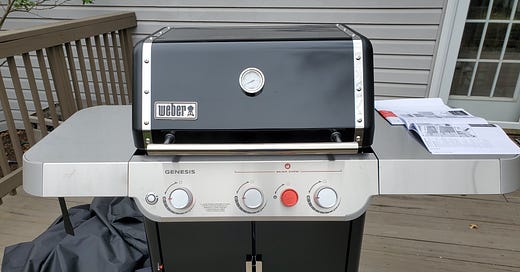


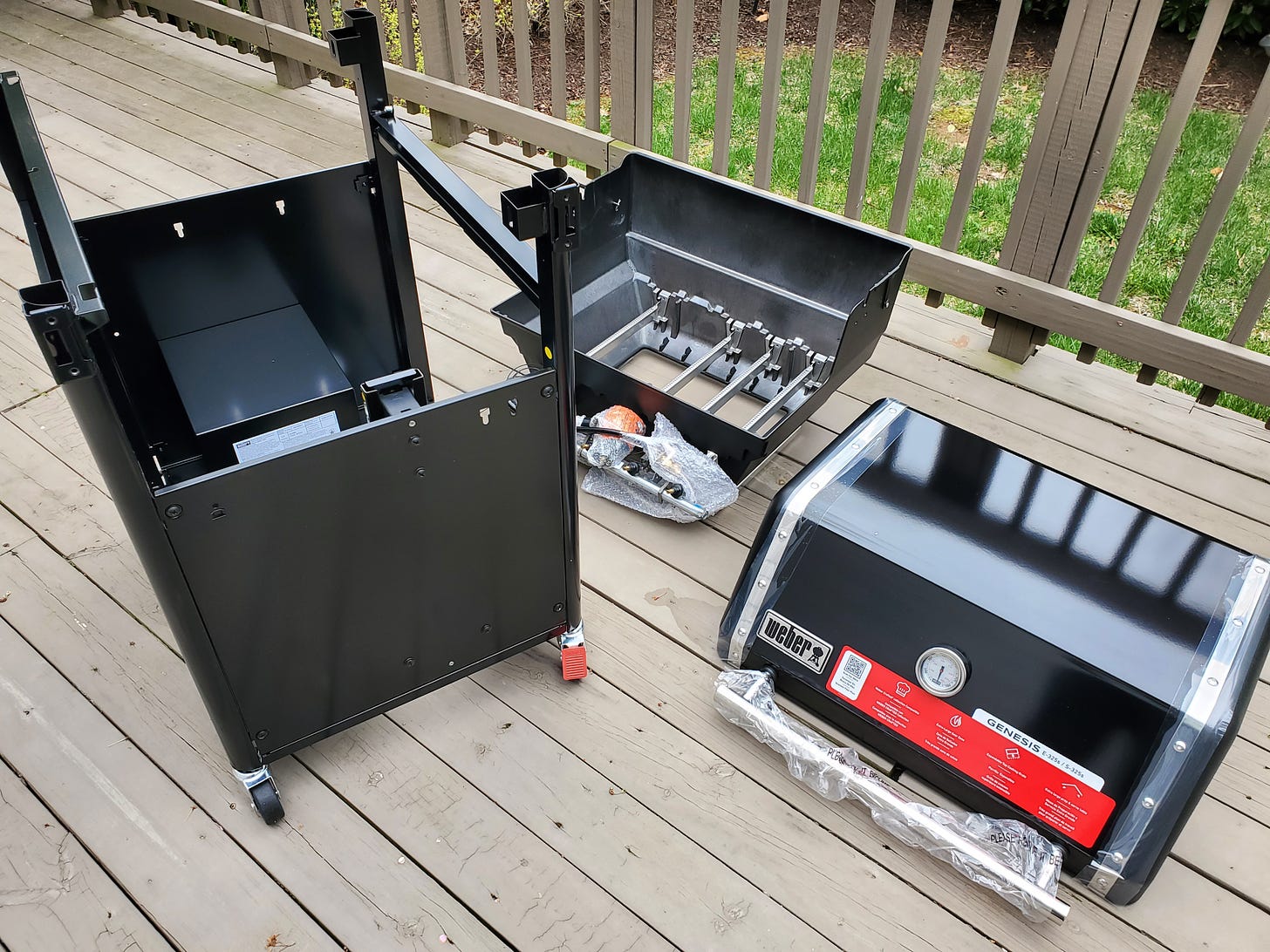



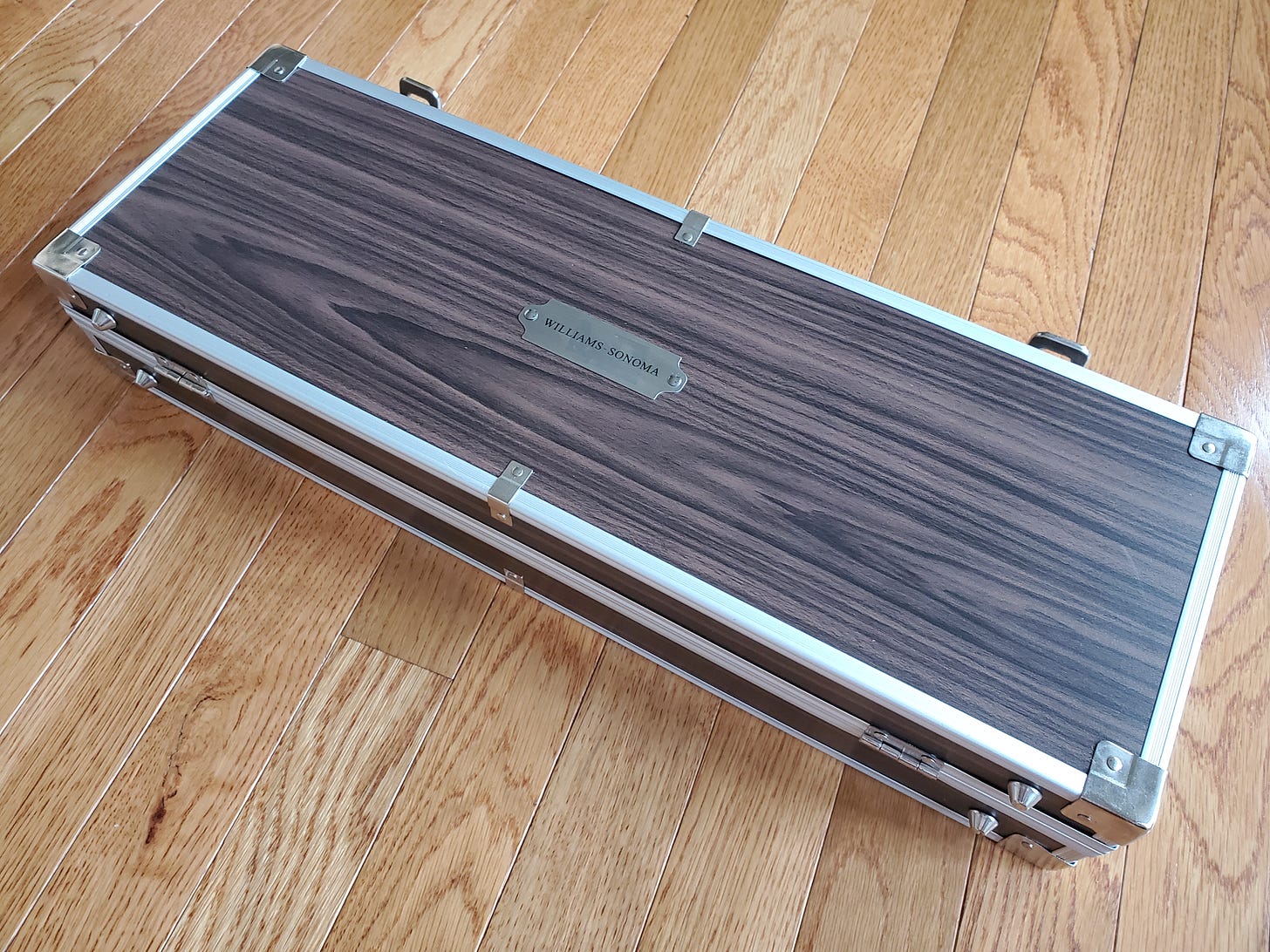
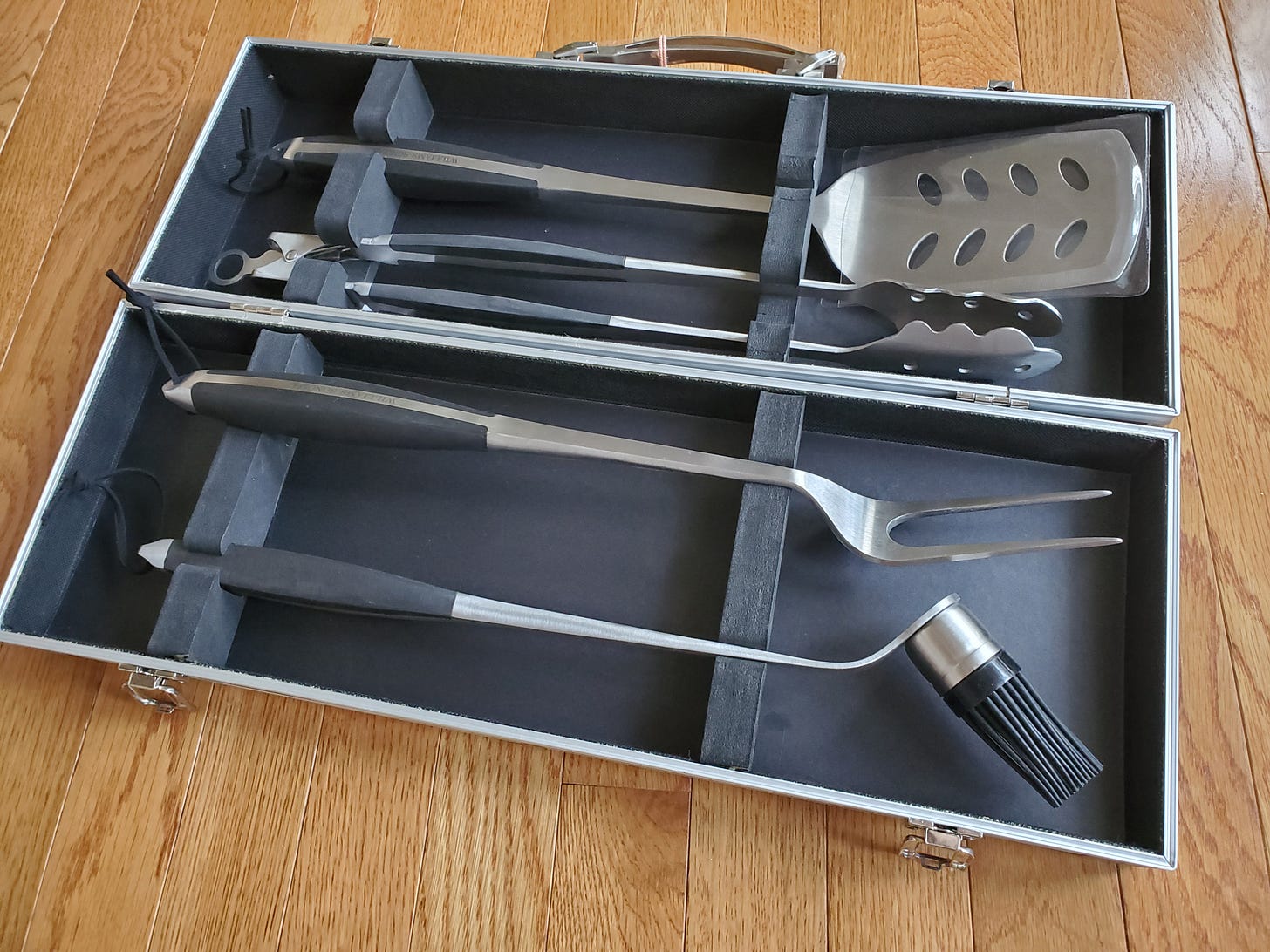
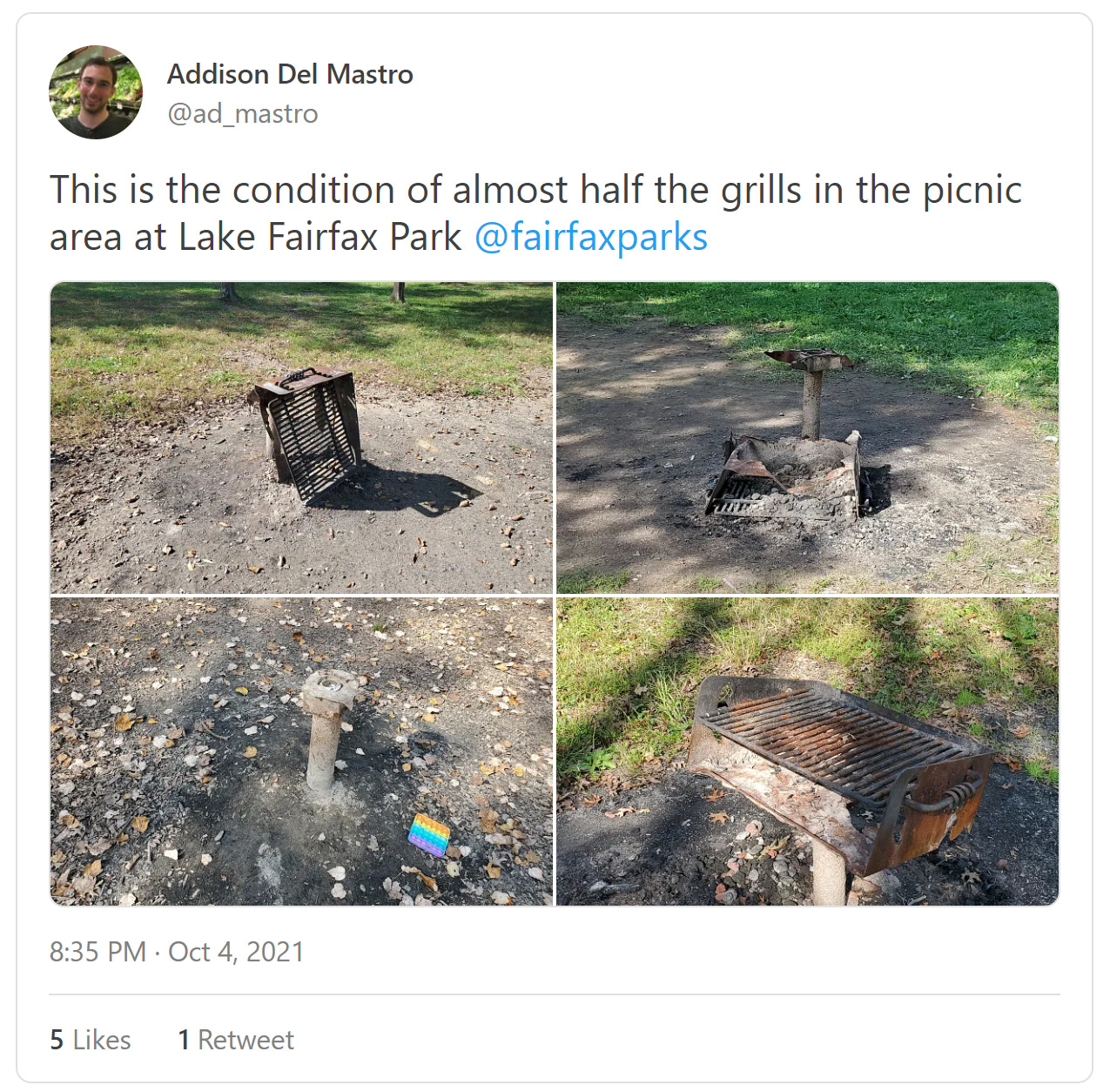
It takes some effort to set a house fully on fire with a properly functioning grill, but one thing they definitely do not play well with is vinyl siding. Picture a cheap takeout container in a microwave. Several years back, it was a serious buzzkill at a friend's Superbowl party he was hosting at his shiny new house in the 'burbs.
You made a good choice spending the extra money for a Weber! I've had a Sprit (the smaller version of the Genesis) for like 10-12 years now and it's still solid. As you said, should I need to update anything, parts are readily available- they're sold on the shelf at my local hardware store in fact. Good read as always!